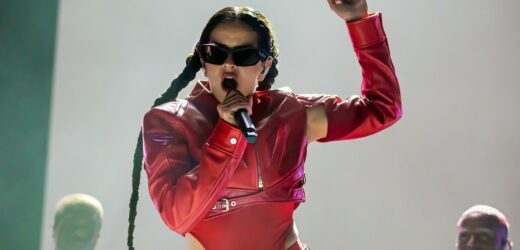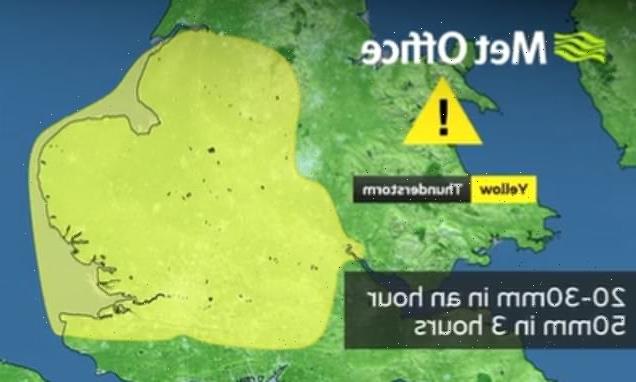Throbbing lights, loud distortion noises, and a neon-lit motorcycle helmet with pigtails — the first few seconds of Rosalía’s Motomami tour stop in Madrid delivered all the spectacle you’d expect. She made her entrance on all fours, crawling, flanked by eight male dancers, motopapis. Together, they thumped to the beat in sync as they made their way to the white seamless backdrop on the stage of the WiZink Center arena on July 19, for one of her biggest and most important shows to date.
The Spanish star has made it clear she wants to experiment and push the boundaries of her music. Her groundbreaking 2019 album, El Mal Querer, masterfully incorporated flamenco, in which she was classically trained, with modern electronic and pop sounds. Her latest album defied expectations by adding a frenetic barrage of reggaeton, bolero, jazz, bachata, and more on top of her flamenco pop base, all orchestrated by her vision and resulting in an unmistakable sound.
Related Reviews
Celebrating — and Arguing About — the Best Pop of 2022 So Far
Your Favorite Artist Needs Touring Musicians. Jammcard is Supplying Them
Related Reviews

Singer Paulette McWilliams on Her Years With Marvin Gaye, Michael Jackson, and Steely Dan
Elvis Presley: His 10 Best Country Songs
Reaching the center of the stage, Rosalía took off her helmet and immediately let out that voice, that crystalline voice, for opening number “Saoko.” Even though sound issues in the venue forced her to change microphones mid-song, the battle cry “Yo me transformo” couldn’t fail to lift up the 15,000 fans in the crowd. Like the butterfly that is one of her favorite motifs, she’s all about transformation. Onstage, she broke free of the comfortable confines of pop performance that she has already excelled at, and that included tossing away the standard arena tour playbook.
There was no live band onstage, which might come as a surprise for someone of her stature but very well in line with the kaleidoscopic collage of her latest album. Rosalía took up musician duties herself, playing the electric guitar in “Dolerme,” the fan-favorite she released in 2020, and the piano in the sensuous “Hentai,” one of the show’s most emotional moments, in which she appeared to be on the verge of tears. (She was also joined by a live piano for the operatic “Sakura” and live organ for “Como un G.”)
Rosalía performs at the WizInk Center in Madrid, Spain.
Tamara Mauri for Rolling Stone
For this tour, Rosalía has ditched her signature nail talons and diamond-encrusted teeth gems. In this, the first of two Madrid shows, she wore a cropped biker jacket and miniskirt in red leather over a red bodysuit and matching knee-high leather boots. Rosalía has been rotating a monochromatic color wardrobe on the tour, all sexy and tough, playful yet controlling, all of which have come to define the powerful Motomami essence she embodies beyond the album. There are no costume changes.
She does it all: She sings and dances, sings while laying down on the floor, while filming herself with a phone camera, while getting picked up by her dancers and even while cutting her own hair during one of the highlights of the show. Sitting alone on a barber chair, singing the track “Diablo” (originally recorded with James Blake), she cut her two long braids with scissors and cleaned off her eye makeup with a white towel. She untangled her hair, got rid of the black eyeliner, and went on with the show.
Fans have seen this onstage stripdown ritual already on Instagram and TikTok, and they knew the set list and what to expect from this world tour, which kicked off earlier this month in Almería, Spain, and will take her to 15 countries across the globe until December. Nothing is surprising, not even one of several unreleased tracks she performed, the Dominican mambo-tinged “Despechá,” which the crowd sang out as enthusiastically as most of the 30-plus tracks in the set (only two of which, “Malamente” and “Pienso en tu Mirá,” came from El Mal Querer). Fans are not bothered by this, on the contrary; they feel part of the show and closer to their ídola.
That blank slate of a stage is also familiar for her audience: It’s an extension of the set from the TikTok livestream that was part of the Motomami launch in March. That immersive experience was translated to the stage by a cameraperson who could very well have been the ninth motopapi dancer, hovering constantly around Rosalía, even standing right in front of her and blocking her from front view. But that’s the point: She sang straight to that camera for the big screens behind her, as well as for the multiple camera phones her dancers also pointed at her. At one point, she sang into a phone that she held while walking down to the crowd while singing “La Noche de Anoche” and passing the mic to the fans to sing Bad Bunny’s parts.
Rosalía performs at the WizInk Center in Madrid, Spain.
Tamara Mauri for Rolling Stone
Does Rosalía really need a live audience when she is singing for the cameras? The Madrid attendees loved it — she was speaking their meta language, and they appreciated the multiple POVs on the big screens that they could then film on their own phones and broadcast to the world. Spotted in the crowd and also basking in the Motomami glow were luminaries like filmmaker Pedro Almodovar, who arrived with actor Pedro Pascal, rappers Residente, Alvaro Díaz, and Kaidy Cain, and Spanish actors Rossy de Palma and Miguel Angel Muñoz.
Even though Rosalía performed all of her most notable collaborations (including “Con Altura” with J Balvin, “TKN” with Travis Scott, and “Blinding Lights” and “La Fama” with the Weekend), she sang over all of those stars’ parts, and they were not missed. The only pre-recorded voice we heard was Dominican star Tokischa on “Linda” and “La Combi Versace.” Rosalía’s voice and little else filled up the arena for standouts like “G3 N15,” only to switch it up to headbanging and distortion for closing song “CUUUUuuuuuute.” The show also included a medley of Lorna’s “Papi Chulo,” Daddy Yankee’s “Gasolina,” and other songs to pay tribute to Rosalía’s love for classic reggaeton. Another unexpected moment was her slowed-down cover of “Perdóname” from 2000s Panamanian group La Factoría, which then segued into a straight flamenco, “De Plata.” Yes, she can pull that off.
On this Motomami tour, it’s all about minimalism and showcasing her raw talent — but it’s also loud and eclectic. In the cover image of the acclaimed album, Rosalía appears naked except for a motorcycle helmet. During her live show, she bares it all even more.
Source: Read Full Article


